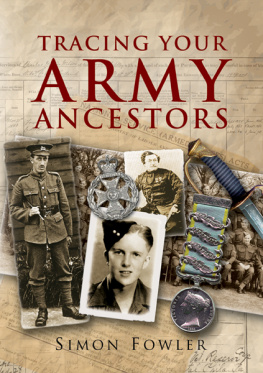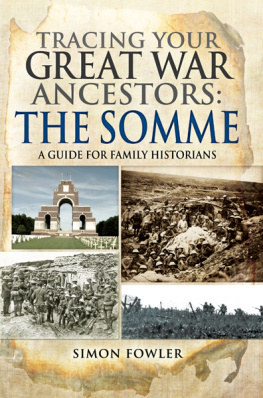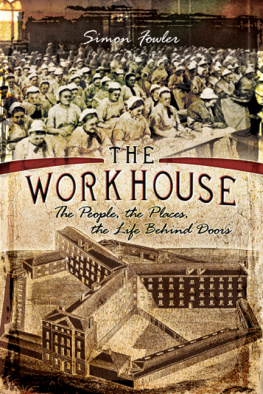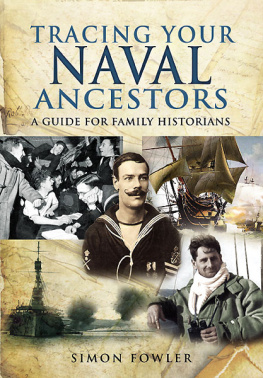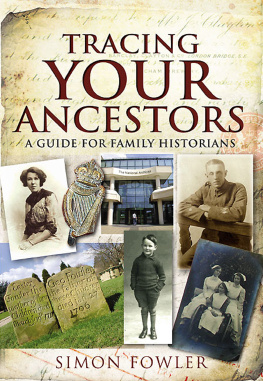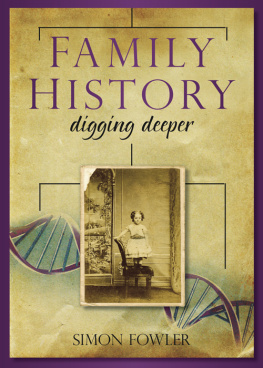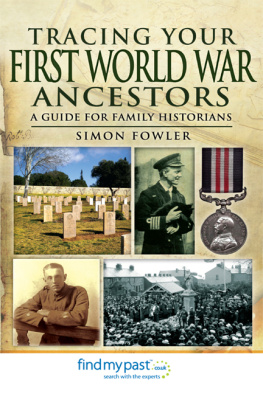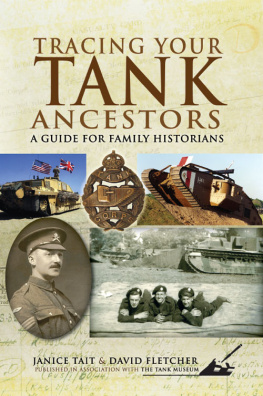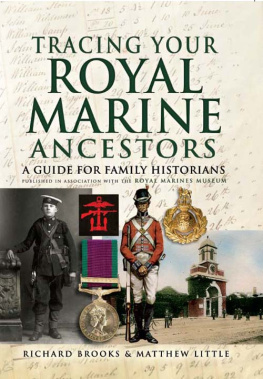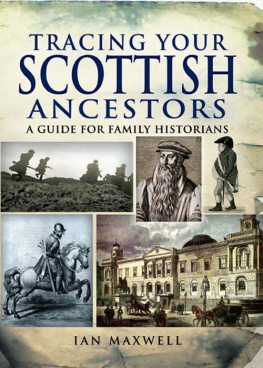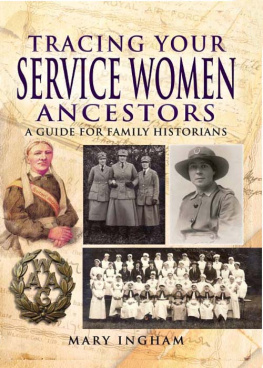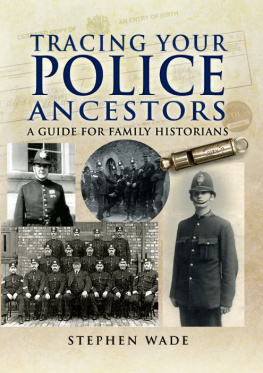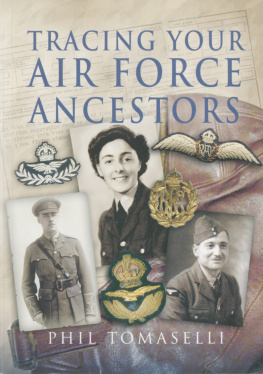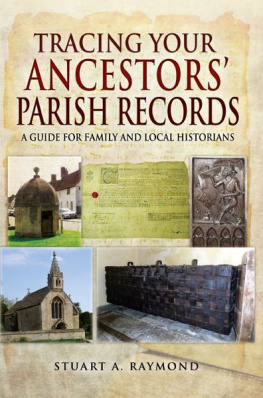FAMILY HISTORY FROM PEN & SWORD
Birth, Marriage and Death Records
David Annal and Audrey Collins
Tracing Your Channel Islands Ancestors
Marie-Louise Backhurst
Tracing Your Yorkshire Ancestors
Rachel Bellerby
Tracing Your House History
Gill Blanchard
The Great War Handbook
Geoff Bridger
Tracing Your Royal Marine Ancestors
Richard Brooks and Matthew Little
Your Rural Ancestors
Jonathan Brown
Tracing Your Pauper Ancestors
Robert Burlison
Tracing Your Huguenot Ancestors
Kathy Chater
Tracing Your East End Ancestors
Jane Cox
Tracing Your Labour Movement Ancestors
Mark Crail
Tracing Your Ancestors
Simon Fowler
Tracing Your Army Ancestors
Simon Fowler
Tracing Your First World War Ancestors
Simon Fowler
A Guide to Military History on the Internet
Simon Fowler
Tracing Your Northern Ancestors
Keith Gregson
Tracing Your Ancestors Through Death Records
Celia Heritage
Your Irish Ancestors
Ian Maxwell
Tracing Your Northern Irish Ancestors
Ian Maxwell
Tracing Your Scottish Ancestors
Ian Maxwell
Tracing Your London Ancestors
Jonathan Oates
Tracing Family History on the Internet
Christopher Patton
Tracing Your Prisoner of War Ancestors: The First World War
Sarah Paterson
Tracing Your Tank Ancestors
Janice Tait and David Fletcher
Great War Lives
Paul Reed
Tracing Your Air Force Ancestors
Phil Tomaselli
Tracing Your Second World War Ancestors
Phil Tomaselli
Tracing Your Secret Service Ancestors
Phil Tomaselli
Tracing Your Criminal Ancestors
Stephen Wade
Tracing Your Legal Ancestors
Stephen Wade
Tracing Your Police Ancestors
Stephen Wade
Tracing Your Jewish Ancestors
Rosemary Wenzerul
Fishing and Fishermen
Martin Wilcox
Tracing Your Canal Ancestors
Sue Wilkes
Tracing Your Lancashire Ancestors
Sue Wilkes
First edition published in Great Britain in 2006, second edition 2013, by
P E N & S W O R D F A M I L Y H I S T O R Y
an imprint of
Pen & Sword Books Ltd
47 Church Street
Barnsley
South Yorkshire
S70 2AS
Copyright Simon Fowler 2006, 2013
ISBN 978-1-78159-086-7
EPUB ISBN: 9781844686681
PRC ISBN: 9781844686698
The right of Simon Fowler to be identified as
Author of this Work has been asserted by him in accordance
with the Copyright, Designs and Patents Act 1988.
A CIP catalogue record for this book
is available from the British Library
All rights reserved. No part of this book may
be reproduced or transmitted in any form or
by any means, electronic or mechanical
including photocopying, recording or by any
information storage and retrieval system,
without permission from the Publisher in writing.
Typeset in 10/12pt Erhardt by
Concept, Huddersfield
Printed and bound in England by
CPI Group (UK) Ltd, Croydon, CR0 4YY.
Pen & Sword Books Ltd incorporates the Imprints of
Pen & Sword Aviation, Pen & Sword Family History, Pen & Sword Maritime,
Pen & Sword Military, Pen & Sword Discovery, Wharncliffe Local History,
Wharncliffe True Crime, Wharncliffe Transport, Pen & Sword Select,
Pen & Sword Military Classics, Leo Cooper, The Praetorian Press,
Remember When, Seaforth Publishing and Frontline Publishing.
For a complete list of Pen & Sword titles please contact
PEN & SWORD BOOKS LIMITED
47 Church Street, Barnsley, South Yorkshire, S70 2AS, England
E-mail:
Website: www.pen-and-sword.co.uk
Contents
If I had time to study war, I think I should concentrate almost entirely on the actualities of war the effects of tiredness, hunger, fear, lack of sleep, weatherit is the actualities that make war so difficult and are usually so neglected by historians.
Field Marshal Lord Wavell to Basil Liddell Hart
(quoted in Ilana Bet-El,
Conscripts: Lost Legions of the Great War, Sutton, 1999)
Preface
T he most popular subject for research at The National Archives at Kew is the military records. Every day dozens of researchers pore through the records and peer at computer screens trying to find out about ancestors who served in the British Army. This book is designed to help them and other enthusiasts find their way through the records and provide background on the life of ordinary officers and soldiers.
That researching military ancestors is so popular is perhaps not surprising. In part this is because military history is immensely popular with a multitude of books published each year (particularly on the two world wars), as well as a plethora of television programmes, not forgetting the thousands of websites which have sprung up in recent years. People are fascinated with the brave deeds and the minutiae of warfare. As Dr Johnson wisely said, over 200 years ago: Every man thinks meanly of himself for having not been a soldier or not having been at sea.
Most families have one or two men who served in the Army, generally of course during the two world wars, but surprisingly often at other times. And unlike for almost every other occupation, full historical records survives.
Working class men driven by patriotism or more often the baser sentiments of hunger and unemployment were the mainstay of the British Army, poorly treated in peacetime and regarded as heroes in wartime. There was a saying that Jack Frost was a great recruiting sergeant. Men from impeccable middle class homes occasionally felt the need to join up as privates, but many more played as weekend soldiers in the Militia and volunteers.
Until the First World War few working class men crossed the class divide to become officers. Officers, particularly in cavalry and infantry regiments, came from a narrow landowning and public school educated social class. The Royal Artillery, Royal Engineers and other corps and units were less exclusive and inevitably made up more of professional men.
In the Napoleonic Wars 80 per cent of Wellingtons armies were made up of ordinary infantry soldiers. This proportion changed as better and more complex technology was introduced, such as more powerful guns and better communications, and the needs of the soldiers began to be recognised, with proper medical care and three square meals a day. However it was not until the Second World War that more soldiers were engaged in the flummery of war as Churchill once said, rather than at the sharp end.
Our soldier forebears generally lived interesting lives. Even if they did not, having a soldier on the family tree is rather more romantic that the normal agricultural labourers (ag labs) and framework knitters from whom we are mostly descended.
At the end of his memoirs of the Peninsular Wars, Rifleman Benjamin Harris sums up the experience of the British soldier not just in Spain and Portugal, but perhaps across the centuries:
Let me here bear testimony to the courage and endurance of that Army under trials and hardships which few armies, in any age, can have endured. I have seen officers and men hobbling forwards, with ragged backs, without even shoes or stockings on their bleeding feet, and with tears in their eyes from the misery of long miles and empty stomachs (and it took a lot to bring a tear into the eye of a Rifleman of the Peninsula). Youths not long removed from their parents home and care, officers and men, bore hardships and privations which, in our own more peaceful days, we have little conception of. Yet these same men, though faint and weary with toil, would brighten up in a moment when the word ran amongst us that the enemy were at hand.
The field of death and slaughter, the march, the bivouac, and the retreat, are not bad places in which to judge men. Having had the opportunity of doing so, I would say that the British are amongst the most splendid soldiers in the world. Give them fair play, and they are unconquerable
Next page
